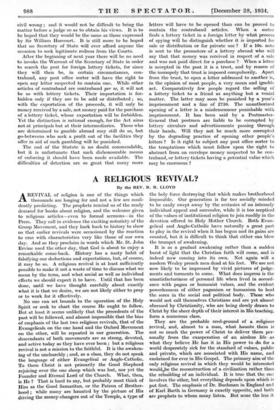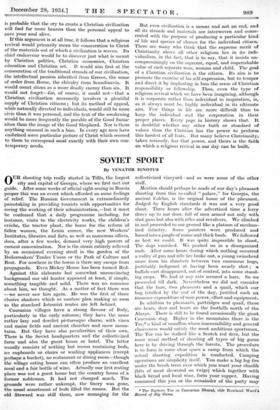A RELIGIOUS REVIVAL?
By the REV. R. B. LLOYD
AREVIVAL of religion is one of the things which thousands are longing for and not a few are confi- dently predicting. The prophets remind us of the ready demand for books about religion, and the welcome given to religious articles—even to formal sermons—in the Press. They call in evidence the exciting notoriety of the Group Movement, and they hark back to history to show us that earlier revivals were occasioned by the reaction to eras with characteristics very like those of our own day. And so they proclaim in words which Mr. St. John Ervine used the other day, that God is about to enjoy a remarkable come-back. History has a nasty habit of falsifying our deductions and expectations, but, of course, it may be so. A religious revival is at least sufficiently possible to make it not a waste of time to discuss what we mean by the term, and what social as well as individual effects we should expect it to have. Until that has been done, until we have thought carefully about exactly what it is that we desire, we are not likely either to pray or to work for it effectively.
No one can set bounds to the operation of the Holy Spirit or seek to chart the course He ought to follow. But at least it seems unlikely that the precedents of the past will be followed, and almost impossible that the bias of emphasis of the last two religious revivals, that of the Evangelicals on the one hand and the Oxford Movement on the other, will be repeated in our generation. The descendants of both movements are as strong, devoted, and active today as they have ever been ; but a religious revival is not a mission to the faithful. It is the awaken- ing of the unchurchly ; and, as a class, they do not speak the language of either Evangelical or Anglo-Catholic. To them Christ is not primarily the Good Shepherd rejoicing over the one sheep which was lost, nor yet the Founder and Eternal Lord of the Church. What, then, is He ? That is hard to say, but probably most think of Him as the Good Samaritan, or the Patron of Brother- hood ; while many are haunted by the picture of His driving the money-changers out of the Temple, a type of the holy force destroying that which makes brotherhood impossible. Our generation is far too socially minded to be easily swept away by the ecstasies of an intensely individual appeal and surrender, while it is too sceptical of the values of institutional religion to join readily in the devotion offered to Holy Mother Church. Both Evan- gelical and Anglo-Catholic have naturally a great part to play in the revival when it has begun and its gains are counted, but it is difficult to think that either can blow the trumpet of awakening.
It is as a gradual awakening rather than. a sudden burst of light that the Christian faith will come, and is indeed now coming into its own. Not again will a modern Wesley preach men dead at his feet. We are not now likely to be impressed by vivid pictures of judge- ments and torments to come. What does impress is the unsatisfactoriness of personal life when lived in accord- ance with pagan or humanist values, and the evident powerlessness of either paganism or humanism to heal the sores in the social and political body. Those who would not call themselves Christians and are yet almost obsessed by Christianity, who are being slowly drawn to Christ by the sheer depth of their interest in His teaching, form a numerous class.
They are the probable seed-ground of a religious revival, and, almost to a man, what haunts them is not so much the power of Christ to deliver them per- sonally from the exasperation of an aimless life as what they believe. He has it in His power to do for a world desperately sick for the standard of values, public and private, which are associated with His name, and enshrined for ever in His Gospel. The primary aim of the only religious revival in which they would be interested would„be the reconstruction of a civilization rather than the rebuilding of an individual. It is true that the one involves the other, but everything depends upon which is put first. The emphasis of Dr. Buchman in England and of Karl Barth in Germany is exactly opposite, and both are prophets to whom many listen. But none the less it is probable that the cry to create a Christian civilization will find far more hearers than the personal appeal to save your soul alive.
If this argument is at all true, it follows that a religious revival would primarily mean the consecration to Christ of the materials out of which a civilization is woven. Its chief endeavour would be to discover just what is meant by Christian politics, Christian economics, Christian education and Christian art. It would aim first at the consecration of the traditional strands of our civilization, the intellectual passion inherited from Greece, the sense of order from Rome, the chivalry from Scandinavia. It would count slums as a more deadly enemy than sin. It would not forget—for, of course, it could not—that a Christian civilization necessarily involves a plentiful supply of Christian citizens ; but its method of appeal, while naturally directed to individuals, would still be more civic than it was personal, and the text of the awakening would be more frequently the parable of the Good Sama- ritan than the image of the Good Shepherd. Nor is there anything unusual in such a bias. In every age men have enshrined some particular picture of Christ which seemed to them to correspond most exactly with their own con- temporary needs. But even civilization is a means and not an end, and all its strands and materials are interwoven and conse- crated with the purpose of producing a particular kind of life and species of chance for the individual citizen. There are many who think that the supreme merit of Christianity above all other religions lies in its indi- vidualism, in the fact, that is to say, that it insists un- compromisingly on the supreme, equal, and imperishable value of each separate man, woman and child. The goal of a Christian civilization is the citizen. Its aim is to promote the exercise of his self-expression, but to temper and direct it by implanting in him the sense of Christian responsibility or fellowship. Thus, even the type of religious revival which we have been imagining, although it is corporate rather than individual in inspiration, is, as it always must be, highly individual in its ultimate aim. Few things in life are more difficult than to keep the individual and the corporation in their proper places. Every page in history shows that. It is doubtful whether any other faith or standard of values than the Christian has the power to perform this hardest of all feats. But many believe Christianity, taken seriously, has that power, and theirs is the faith on which a religious revival in our (14 can be built.



































 Previous page
Previous page